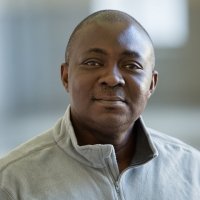Hate Speech and the Challenges of Post-Election Peacebuilding in Nigeria
On May 1, 2018, the Wilson Center Africa Program hosted an event entitled, “Hate Speech and the Challenges of Post-Election Peacebuilding in Nigeria.” Ms. Hayley Elszasz, Program Assistant at the Wilson Center Africa Program, gave introductory remarks. Ms. Hannah Beckett, Program Associate at the Africa Program, moderated the event. This discussion featured Dr. Olusola Isola, current Southern Voices Network for Peacebuilding Scholar at the Wilson Center and Senior Research Fellow at the Institute for Peace and Strategic Studies at the University of Ibadan in Nigeria. Mr. Vasu Mohan, Technical Lead for Elections, Conflict, and Security and Regional Director for Asia-Pacific at the International Foundation for Electoral Systems also offered remarks.
Mr. Mohan opened the discussion by outlining the broader issue of hate speech in all societies and the key challenges ahead for combatting it. Hate speech does not manifest only during election periods, but these times can often exacerbate existing cleavages and exploit prejudices. One key problem is defining the issue; hate speech is defined differently in different contexts, which in turn affects the legislation that seeks to regulate it. “Hate spin,” or manufactured offense, is a powerful force that comes into play particularly during election cycles. This typically involves mobilizing a particular group against another and crafting intentional campaigns meant to divide. Hate spin often includes the use of hate speech, which vilifies a particular group. There are three primary responses to hate speech: no response (often justified on the grounds of protecting freedom of speech), statutory (or legal) responses, or non-statutory responses. Legal responses to hate speech are sometimes codified in constitutions; legislation can be found under election, criminal, political party, media, or human rights law. Along with definitional challenges, another issue is that of implementation. Often, governments fail to implement existing hate speech legislation, or, they apply the legislation too broadly, which can undermine freedom of speech and democracy. Hate speech that targets women is sometimes included under hate speech legislation and sometimes is not, although it is a key factor that can dissuade women from seeking public office. Electoral stakeholders (including ministries, local government officials, civil society, the media, and electoral observers) have an important role to play in countering hate speech, and training these stakeholders can make a difference in reducing the deleterious effects of hate speech on peacebuilding during elections. Electoral stakeholders must raise public awareness, advocate for better legislation, and create space for inclusive dialogue. The ultimate goal is to reach a societal consensus regarding hate speech through the dissemination of knowledge.
Dr. Isola presented his research undertaken during his time at the Wilson Center, which examined Nigeria as a case study in hate speech during elections. The high concentration of political power and the winner-takes-all mentality around elections contribute to the use of hate speech. In Nigeria, the states depend on the central government for fiscal survival. Electoral conflict can become intractable for presidential contests especially, as resources are concentrated with the central government. The dynamics of the civil war in the late 1960s continue to impact the relations between the northern and southern states. This already challenging context is complicated by the high rate of unemployment and poverty in much of the country. Election periods provide an opportunity for groups to vent frustrations. Both physical and online campaign advertisements play into these divisions and frustrations; however, in the last two elections, social media has played a larger role. The increased anonymity of social media posts and the ability to spread to large audiences makes it potentially more dangerous than the traditional advertisements. Derogatory terms are used to mobilize groups and incite violence. For example, Human Rights Watch reported over 800 people killed in riots during the 2011 election season. Hate speech during elections poses a challenge to peacebuilding efforts in the long-term, as reconciliation can be difficult even after elections are over. There are various legislative acts that exist in Nigeria to regulate the spread of hate speech during elections, which call for prison time or fines for those convicted. However, no prosecutions have been recorded on the basis of these laws. Although laws are in place, there is a lack of political will for implementation. The senate has gone as far as to propose the death penalty as a punishment for hate speech, but such a law is not likely to be passed due to its extreme nature. The media is already mobilizing against the measure to prevent the senate from voting on it. Instead of increasing the punishment, Dr. Isola recommends that the government collaborate with the media and civil society to activate modalities for educating the electorate and ensuring that all stakeholders are aware of hate speech issues and are trained to combat them. Elections are coming in 2019, and there is an urgent need to take the issue of hate speech seriously in order to prevent violence and set the stage for peacebuilding in Nigeria.
The Southern Voices Network for Peacebuilding (SVNP) is a continent-wide network of African policy and research organizations that works with the Africa Program to bring African analyses and perspectives to key issues in U.S.-Africa relations. Funded by the Carnegie Corporation of New York since 2011, the project provides avenues for African researchers to engage with, inform, and exchange perspectives with U.S. and international policymakers in order to develop the most appropriate, cohesive, and inclusive policy frameworks for the issues of peacebuilding and state-building in Africa.
This event was livetweeted and webcast. Follow the Africa Program Twitter account @AfricaUpClose and catch up on the conversation #HateSpeechinNigeria.
Speakers

Senior Lecturer in Peace, Security and Humanitarian Studies Department, University of Ibadan, Nigeria
Moderator

Hosted By

Africa Program
The Africa Program works to address the most critical issues facing Africa and US-Africa relations, build mutually beneficial US-Africa relations, and enhance knowledge and understanding about Africa in the United States. The Program achieves its mission through in-depth research and analyses, public discussion, working groups, and briefings that bring together policymakers, practitioners, and subject matter experts to analyze and offer practical options for tackling key challenges in Africa and in US-Africa relations. Read more
